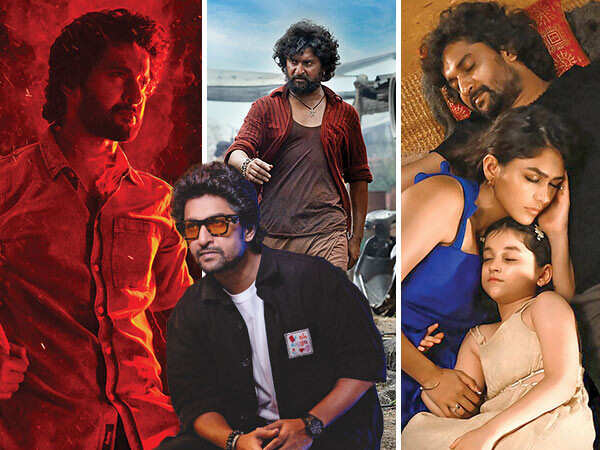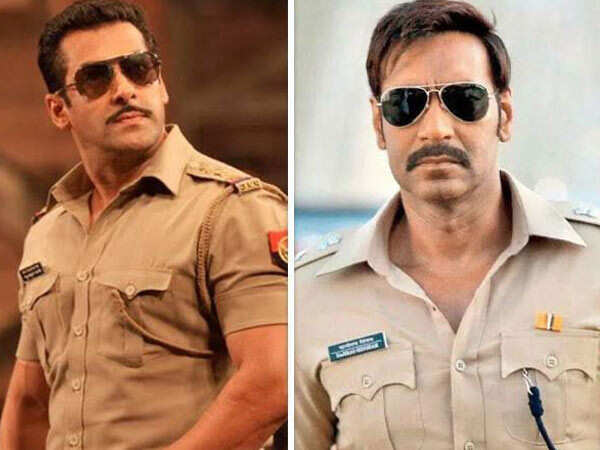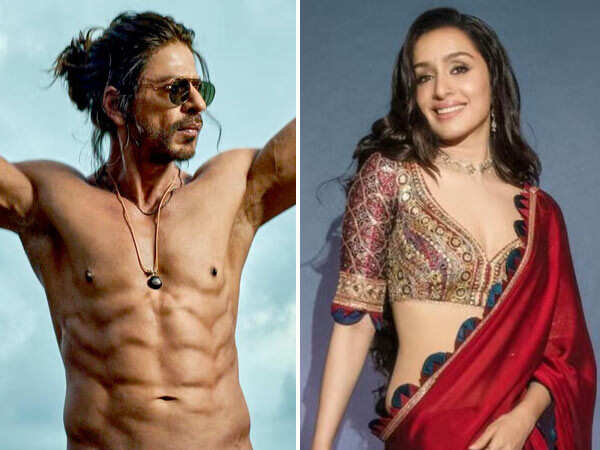EXCLUSIVE: Iâm seeing more appreciation than ever says Nani
7 min read
The first thing you notice about Natural Star Nani, before your heart skips a beat from merely being in his presence, is his warmth. Meeting the Telugu superstar for a late-night tête-à-tête in Mumbai days after our South Awards in Hyderabad, where we had interacted a bit, brings a certain comfort and familiarity. He has a way of putting you at ease. “If I was a superhero, I’d need all the superpowers so that I can save people,” he muses as our conversation ranges from movies and superpowers. “Sounds like kindness is your superpower,” I tell him to which he playfully replies with a wide smile, “Oh, I already have it then!” As he laughs and relaxes in his seat, you don’t feel like you’re talking to a pan-Indian star with a massive fan base. Away from the arc lights, he remains the same wide-eyed person very much in love with cinema, who joined the industry as an assistant director. Nani’s stardom has grown exponentially over the past few years but so has his love for his chosen profession. As we chat about everything from the popularity of Hi Nanna to his latest film Saripodhaa Sanivaaram, which is his most massy film yet, he lays bare his process, his inspirations and more…
What does winning the Filmfare Award for Best Actor in a Leading Role (Male) – Telugu for Dasara mean to you?
Winning the Filmfare Award for Best Actor in a Leading Role (Male) for Dasara was special. But the real highlight for me was handing the Best Debut Director Awards to my two directors from last year. Despite doubts about my decision to work with newcomers, both directors delivered blockbuster hits and won the same award. It felt like a fairytale moment to not only win myself but also to be part of their success in such a meaningful way.
You’ve switched gears going from Dasara to Hi Nanna. Was that intentional?
While I prefer to explore different scripts and genres rather than repeating myself, I don’t pre-decide that if I’ve done a love story, my next film must be an action one. I simply look for what excites me in the moment, which could be any of the several genres. My goal is to stay engaged with my work rather than follow a set pattern.
What excited you most about Saripodhaa Sanivaaram?
The concept itself was incredibly exciting. While many action films follow a similar formula of hero vs villain and the triumph of good over evil, this story offered something unique. Vivek pitched a character with anger issues, who promises his mother to only show his anger once a week, on Saturday. The idea of a hero having to suppress his anger and record it until he can release it adds a fresh twist to the typical action narrative. This innovative approach made the project stand out, and I was immediately captivated by it.
How do you deal with rage?
Rage is a strong word, and I don’t often experience it. Anger itself is rare for me; I usually find it hard to hold onto it. I believe that sometimes anger is necessary to prevent others from taking you for granted. However, I tend to calm down quickly, often within ten minutes. Occasionally, I feel a mix of anger and disappointment when things don’t go as planned, especially when someone isn’t giving their best effort on the set. In those moments, I listen to music to help me manage my emotions and regain my composure.
Why is this trope of a character underplaying his strengths till he lets loose one fine day so popular?
The concept of a hero who holds back his reactions until a specific moment is a popular formula in action films, like in Baahubali or Baasha. The anticipation builds until the hero finally unleashes his power, causing the audience to erupt with excitement. In Saripodhaa Sanivaaram, the unique twist is that the hero only reacts on Saturdays, exactly at midnight. This premise itself creates a compelling energy, as his controlled anger and the precise timing add a fresh dynamic to the action genre. I thoroughly enjoyed the process of bringing this innovative concept to life.
What is the process of balancing the action and emotion of a mass entertainer?
Emotion is crucial in an action film; without it, even the best action scenes can fall flat. Many action films fail because they lack emotional depth. For a film to succeed, it must emotionally engage the audience, allowing them to connect with the characters and empathise with their struggles. This connection makes the action more impactful and satisfying. If viewers can’t relate to or feel the characters’ pain, no amount of action or special effects can make up for it. I enjoy action scenes that are developed through strong emotional storytelling.
The Angry Young Man discourse recently opened up again. Tell me about the impact Amitabh Bachchan has had.
Mr. Bachchan is an inspiration not just for me, but for many actors. He represents a rare combination of talent and presence that comes once in a century. In Kalki 2898 AD, his ability to convey profound impact with just a single word is something that even the most elaborate CGI or background scores can’t achieve. His voice, appearance and personal charm create an unmatched synergy that makes him compelling on screen. When Suryah Garu compared me to him, it felt like the highest honour. Even though I’ve only been in the industry for 16 years, being associated with such a legendary figure is truly humbling.
What was your experience of working with S.J. Suryah?
Suryah sir is a phenomenal actor and director whose work I’ve admired for years, especially Vaalee and Kushi, directed by him. Initially, I was surprised when he shifted to acting, thinking he was a great director and questioning his new path. However, I’m now completely convinced that acting is where he truly belongs. His unique screen energy and presence elevate every scene he’s in. After seeing his performance as Daya, it’s clear that he was perfect for the role, enhancing the film in ways that only his talent could achieve.
You are known as a Natural Star but there’s a lot of hard work that goes into being an actor. How are you feeling about your stardom at the moment?
I don’t focus on measuring my success or my current standing but I do appreciate the immense love I receive wherever I go. My success isn’t defined by traditional metrics but by the growing connection I have with a larger audience over the years. Whether it’s due to releasing films in multiple languages or the impact of OTT platforms, I’m seeing more appreciation than ever from all corners. While I don’t like to label it as stardom, I’m happy with how things are unfolding and how each film helps me connect more deeply with the audience.
Would you say that you’re a director’s actor?
Yes, I consider myself a director’s actor. I aim to provide my directors with a range of options for each scene, offering different takes so they can choose the one that fits best. Consistency in portraying a character is crucial and providing multiple options helps maintain the nuances throughout. Having been an AD myself, I always wanted my actors to approach their roles this way, so I strive to be that kind of an actor for my directors.
How important is it for you to connect with the characters you portray?
Connecting with my characters is essential and I focus on this during preparation, filming and while watching the final film. However, I’m not a method actor; I don’t stay in character off the set. Instead, I switch into character mode while filming, concentrating on the emotions the character is experiencing at that moment. It’s a balance between my own self and the character, rather than a constant immersion.
Do you enjoy watching your own films?
I enjoy watching my films on release day but then I quickly shift focus to my next project. I am critical of my work throughout the process. Even during shooting, I rarely focus on my own performance; instead, I assess whether the entire frame, including every actor and motion, is working well. I remain highly critical of myself until the project is completed. Even when the director says a take is okay, I often ask for another because I feel it might not be right yet.
How do you feel when you look back on your acting journey from let’s say Eega to Dasara?
There’s been a significant change in my career, though I can’t pinpoint exactly how it all happened. When I started, I had limited choices in roles and often did what was available. Over time, I’ve made the most of the opportunities I had to grow and reach a wider audience. Now, I can pursue stories I’m passionate about and believe others will enjoy as well. My career has progressed as it should, and with the choices I have now, I focus on what I can contribute to each film. I’ve learnt a lot from my journey and have a deeper understanding of cinema and the craft. I’m now able to approach my work with greater insight and conviction.
How much does working with SS Rajamouli change you as a person and as an actor?
Every director I’ve worked with has influenced me in different ways. Early on, I did small-budget films but then I entered the world of Rajamouli sir, with a film like Eega that dramatically exceeded its initial budget. His vision required a much larger investment, which exposed me to a new scale of filmmaking. Working with Rajamouli sir taught me to think beyond practical constraints and embrace boundless creativity. This experience was eye-opening and significantly shaped my understanding of filmmaking and my approach to the craft.Nani laid bare his process in an exclusive interview with Filmfare. Continue reading …Read More




